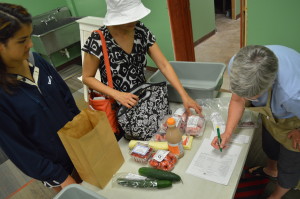
Customers pick up their order during a distribution day at the Iowa Valley Food Co-op in Cedar Rapids. (photo/Cindy Hadish)
By Cindy Hadish/for the Radish Magazine
The word “food” can easily evoke a mental image, while the term “food hub” is a bit more nebulous.
Still, more people are becoming familiar with food hubs as a way to bring food from the farm to the table, and a new report shows food hubs are playing an emerging role in Iowa’s local and regional food economy.
Food hubs are defined as a business or organization that actively manages the aggregation, distribution and marketing of locally and regionally produced food; basically providing a way to connect farmers with consumers. Examples include the Iowa Valley Food Co-op, based in Cedar Rapids, and the aptly named Quad Cities Food Hub.
The new study, conducted by a group of local and regional food leaders and published by the Leopold Center for Sustainable Agriculture, identified 16 food hubs and an additional 15 centers of food hub-related activity in Iowa.
Food hubs are a critical link in bringing local foods from the farm to high-volume, mainstream outlets such as grocery stores, restaurants and institutions, the Leopold Center notes, and as such, are the local food movement’s answer to bringing high quality food to families of all income levels.
“Expansion of local and regional food systems has been linked to solutions that address some of our nation’s most pressing social problems, including economic and rural community development, obesity prevention, family farm preservation, food security and environmental protection,” said Corry Bregendahl, of the Leopold Center, one of the report’s authors. “However, local foods may not be readily available, with high-income families often enjoying the easiest access.”
Food hubs, Bregendahl said, are viewed as an important way to bring local foods from the farm to the table for everyone.
The study gathered financial performance, structure and operations data from 13 of the 16 food hubs identified throughout the state.
According to the report, those food hubs purchased $4.5 million in local food from more than 450 Iowa farmers, supporting 58 jobs.
If the sample businesses were representative of all 31 food hubs and centers of food hub-related activity in the state, the report noted, Iowa food hubs could be handling more than $10 million of locally grown food in the state.
Additionally, food hubs may offer education and training to farmers to increase their capacity to meet high-volume demand, and play a key role in providing healthy, locally grown food in places where people of all backgrounds live, shop, work and play.
Other findings included:
-
Sixty‐two percent of food hubs in Iowa said they were profitable in 2013.
-
A variety of financial resources support food hub activity, including
product sales, membership fees, the organization/founders’ own capital, income from food hub programs, private investment, bank loans, business loans, donations, in-kind support, foundation grants and government funding. -
Food hubs depend on seasonally grown crops. Nearly 60 percent of food sales for participating food hubs were fruit and vegetable sales, with 17 percent of sales for meat and eggs; 11 percent for dairy products and 6 percent for processed foods or grains and legumes.
-
Most food hub activity in Iowa is concentrated around Des Moines, Cedar Falls/Waterloo, Cedar Rapids, Iowa City and in northeast Iowa near Decorah and southeast Iowa near Fairfield.
The Quad Cities Food Hub stretches between Iowa and Illinois. The nonprofit supports local food production, connecting producers and consumers; cultivates education and training programs; preserves and expands sustainable agriculture; fosters local economic development; and promotes healthy lifestyles through the use of local foods.
A web-based cooperative, the Iowa Valley Food Co-op serves as a facilitator in which consumers can order products directly from area farmers and other local businesses. The co-op provides an online marketplace for all types of local producers; processes orders and payments; and facilitates delivery to consumer members.
The food hub study was funded by a grant from Ag Ventures Alliance and the USDA’s Sustainable Agriculture Research and Education program, with support from the Leopold Center.
Among the report’s recommendations is a need for more detailed information about producers who may be interested in participating in a food hub and are ready to scale up production for larger markets. Other recommendations include the need to form a food hub manager working group to better explore strategic cooperation, and a need for continued work toward business goals.
“Food Hub Development in Iowa: Lessons learned from a study of food hub managers and regional food coordinators” is available on the Leopold Center website at: www.leopold.iastate.edu/food-hubs
Read more about healthy living in the Radish Magzine

No Comments Yet